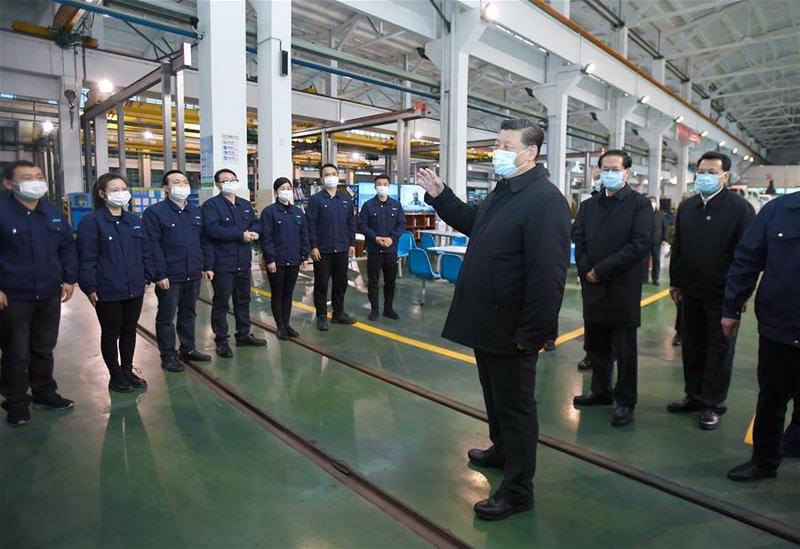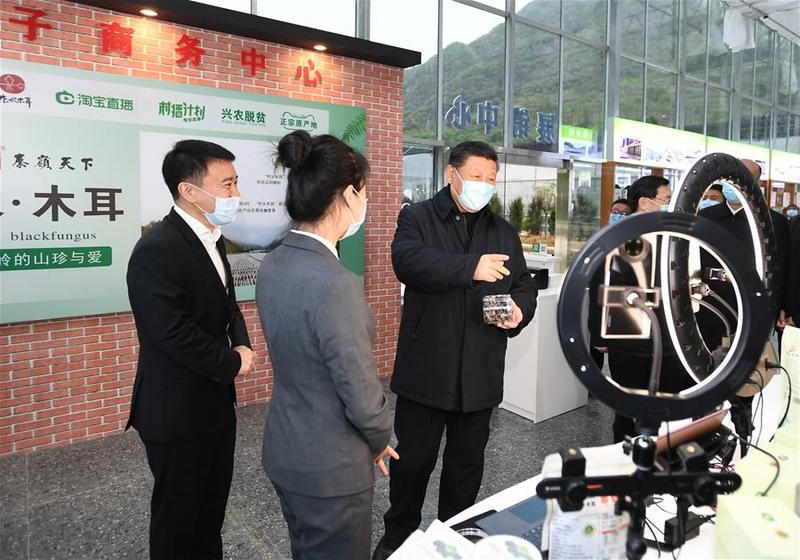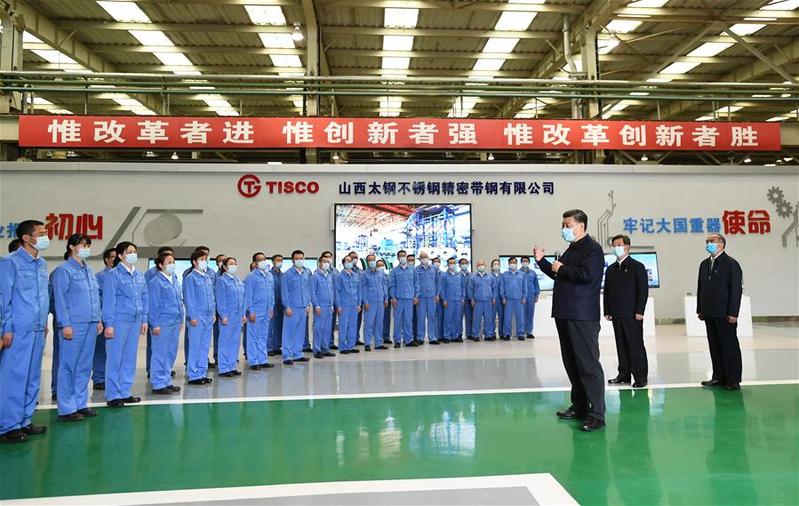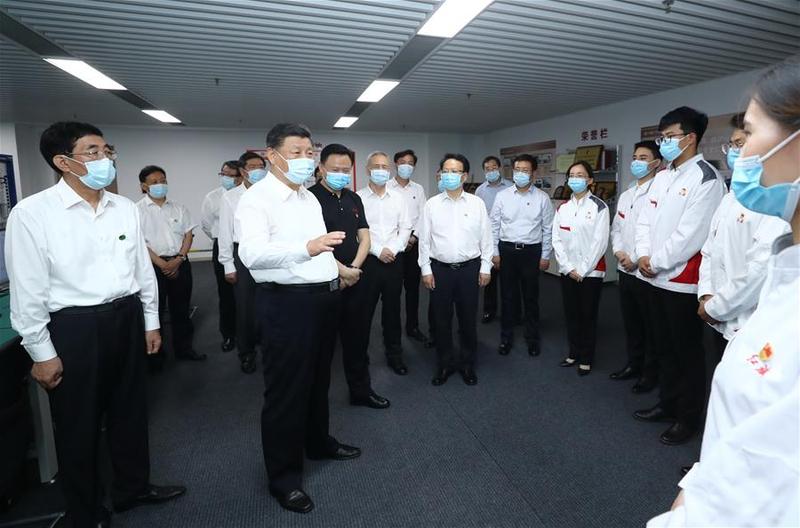


Rise above trials and tribulations
Xi said national rejuvenation would not come easy and great struggles must be fought to realize the great dream.
The epidemic brought severe challenges to the world's largest developing country, but showed the importance of following its own path and adhering to reform and opening up.
Initially, medical materials were in short supply and weak links in hospital protection led to infections among health workers. Practices of bureaucratism and formalities for formalities' sake were exposed at local levels.
While fighting the coronavirus as the most pressing task, Xi pushed for building institutions with a long-term impact.
Last year, the fourth plenary session of the 19th CPC Central Committee adopted a decision on institution building. Xi said China must use the strength of its institutions to cope with risks and challenges.
"The epidemic was a big test for China's system and capacity for governance," Xi said bluntly. "We must draw experience and learn our lessons."
He said the exposed shortcomings told of the need to improve the national emergency management system and boost the nation's ability to handle urgent and challenging tasks.
In February, Xi demanded efforts to strengthen public health legislation, reform the disease prevention and control system, and improve public health services when he chaired a meeting of the Central Commission for Comprehensively Deepening Reform.
Two months later, the commission's meeting adopted documents on the provision of public health emergency supplies and on oversight of medical insurance funds.
During the "two sessions," when joining deliberations with lawmakers from Hubei, Xi stressed fortifying the public health protection network.
Several priorities were in the spotlight: reform the disease prevention and control system; boost epidemic monitoring, early warning and emergency response capacity; advance the treatment system for major epidemics; improve public health emergency laws and regulations; and carry out patriotic public health campaigns.
The COVID-19 pandemic is dealing a heavy blow to the world economy. More than four out of every five people in the global workforce of 3.3 billion have been affected by full or partial workplace closures, according to a report by the International Labour Organization in early April.
Xi told a symposium on economic and social work that the pandemic will accelerate the profound changes the world is undergoing, changes unseen in a century.
The Chinese economy shrank 6.8 percent in the first quarter. On the day the statistics were released, Xi chaired a leadership meeting that pointed out the first quarter of 2020 was "extremely unusual." The sudden COVID-19 outbreak had an unprecedented impact on China's economic and social development.
On dealing with the impact on the economy, Xi said: "We must stay confident and not be frightened by problems and difficulties."
"I have said many times that China is a big country with enormous resilience, huge potential and great flexibility in development," he added.
Xi said at the "two sessions" that China has set no specific target for economic growth this year as the sudden COVID-19 outbreak has created challenges to completing the tasks in this final year of the 13th Five-Year Plan.
He emphasized the importance of maintaining stable and sound economic performance in the long run, and devised a series of strategic measures including the creation of a new development pattern in which domestic and foreign markets boost each other, with the domestic market as the mainstay.
Since early February, Xi has been giving instructions on stabilizing the economy.
From March to August, he visited villages, rural families and businesses on inspection tours to coordinate regular epidemic control with economic and social development.

Xi Jinping visits an industrial park which produces high-end auto parts and molds in Ningbo, east China's Zhejiang Province, March 29, 2020. Xi inspected Zhejiang Province from March 29 to April 1. [Photo/Xinhua]
In Zhejiang Province, Xi chatted with workers by an assembly line, asking if their return to work had gone smoothly, particularly if they had received their paychecks. He demanded the prices of daily necessities and the income of farmers remain stable.
In Shaanxi Province, he encouraged companies to overcome the negative impact of COVID-19 and actively expand markets. In the village of Jinmi, Xi lauded the local black fungus industry. This went viral online, and 20 million people visited the e-commerce sites, where over 20 tonnes of black fungus were sold out in quick succession.

Xi Jinping learns about development of the black fungus industry at a training center in Jinmi Village of Xiaoling Township in Zhashui County, Shangluo City, northwest China's Shaanxi Province, April 20, 2020. Xi inspected Shaanxi Province from April 20 to 23. [Photo/Xinhua]
In Shanxi Province, Xi called on businesses to make up for lost time with the proper safety precautions in place.

Xi Jinping speaks with workers during a research tour in a stainless steel manufacturer in Taiyuan, north China's Shanxi Province, May 12, 2020. Xi inspected Shanxi Province from May 11 to 12. [Photo/Xinhua]
In Ningxia Hui Autonomous Region, he said no ethnic minority group should be left behind in building a moderately prosperous society in all respects. He also urged efforts to maintain epidemic control measures while accelerating the return to normalcy in people's daily lives.

Xi Jinping talks with Liu Kerui, a villager of the Hui ethnic group, and his family in Hongde Village of Wuzhong, northwest China's Ningxia Hui Autonomous Region, June 8, 2020. Xi inspected Ningxia from June 8 to 10. [Photo/Xinhua]
In Jilin Province, Xi took a particular interest in the employment of college graduates and migrant workers and ordered Party committees and governments at all levels to actively create favorable conditions for college graduates to find jobs.

Xi Jinping talks with employees who have recently graduated from universities at the R&D headquarters of automaker FAW Group in Changchun, northeast China's Jilin Province, July 23, 2020. Xi inspected Jilin Province from July 22 to 24. [Photo/Xinhua]
The Chinese economy bounced back to growth in the second quarter of 2020, expanding 3.2 percent year on year. Major indicators returned to growth, economic performance steadily recovered and market expectations were positive in general.
Foreign direct investment into the Chinese mainland, in actual use, also grew 8.4 percent year on year in the second quarter, indicating foreign investors' growing confidence in the Chinese market.
By mid-April, over 99 percent of major industrial enterprises in China had reopened. They included foreign companies and their local suppliers like Apple, Tesla and Volkswagen.
Writing back to Global CEO Council members' representatives in July, Xi said those CEOs had made the right choice by staying rooted in China.
Six days later, when he attended a symposium with entrepreneurs, Xi said: "We must shore up confidence, rise up to challenges, work hard to recover the loss caused by COVID-19, and strive for good economic development for the whole year."
The spring and summer of 2020 represent an unusual chapter in the Chinese nation's journey toward rejuvenation.
Under Xi's leadership, the Chinese people are united to contain the COVID-19 outbreak. With epidemic control measures in place, China has secured a bumper summer grain harvest, overcome floods and made solid progress to eliminate poverty. In the meantime, China, as a major and responsible country, is actively advancing global cooperation against the pandemic. During this process, China's socialist system has demonstrated its strengths.
In this extraordinary year, Xi has taken on great responsibility, firmly fulfilled his commitment to the people, and worked hard to eradicate poverty and achieve a moderately prosperous society in all respects.
"The Chinese nation has experienced many hardships in its history, but it has never been weighed down. Instead, it has grown stronger and stronger through trials and tribulations," Xi said.
